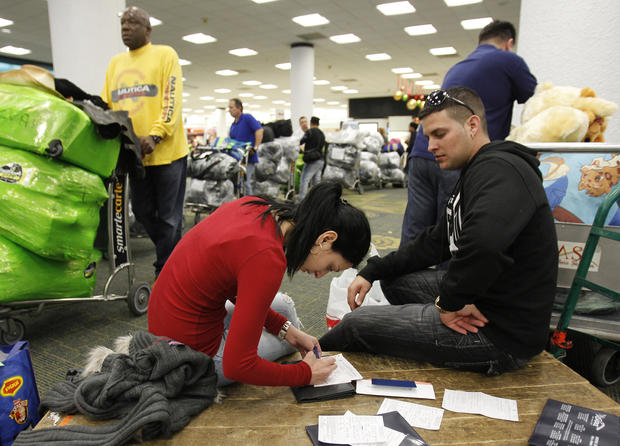Cuban-Americans going home for Christmas
HAVANA - Twenty-nine flights from the U.S. landed Thursday at Havana's Jose Marti International Airport, forcing airport administrators to quickly shuffle employees around to reinforce the baggage handlers and immigration officials swamped by holiday travelers, mostly - though not all - Cuban-Americans coming here to spend Christmas and New Year's Eve with relatives.
An equal number of flights have been coming in all week.
The number of arrivals is typical for the month of December when Cuban exiles and island Cubans reconnect to share the traditionally family-oriented Noche Buena (or Christmas Eve) dinner.
Now however, the flights are not just from Miami, but come from Tampa, Ft. Lauderdale, Oakland, Los Angles, New York, Atlanta and Puerto Rico.
The presence of these Cuban-Americans highlights one of the hottest topics in Cuba at this moment: the freedom to travel when and where one wants.
Speculation is rife that President Raul Castro will use today's parliament meeting to announce the relaxation of restrictive rules affecting both Cubans wanting to travel aboard and Cuban exiles wanting to travel home.
Well-informed sources have been saying that changes would be announced in January, but Cubans fed up with the old regulations and encouraged by Castro's recent spate of liberalizing laws are anticipating an announcement before the year's end, though skeptics question whether it will ever come.
Cubans on the island face a triple whammy: they must get permission (and it's not always forthcoming) from their own government to travel, AND pay a hefty $150 for an exit permit on top of the $50 for their passport.
In addition, most countries in the world fearing Cuban visitors as potential immigrants require Cubans to obtain a visa before they grant them entry, often a major hurdle. Wishful thinking has it that Havana will abolish the now required "permit to travel."
Cuban exiles, the ones filling those flights from the U.S., must pay to obtain valid Cuban passports to enter the island nation, even if they have become citizens in their country of residence.
Furthermore, until now Cubans who travel abroad to visit relatives or for other reasons must return home within eleven months or they lose their rights - and any property they own. The exit permit, which they paid $150 for is only valid for one month, so if they stay abroad longer they must pay a varying amount every month to extend their "permit to travel." Rumor has it that one change will be to allow Cubans to extend their permission to remain abroad up to two years.
One compelling pretext for these regulations is to prevent a brain drain. After all, education in Cuba is totally free, and Havana doesn't want to lose the doctors it put through medical school or other professionals trained at public expense, so it's very unclear how they might benefit from any travel reforms.
Cuban academic and former diplomat Carlos Alzugaray recently told a Miami radio show that the fear of a brain drain is valid, but he believes that once professionals know they can leave and enter their country freely and as Cuba's economy recovers providing them with more opportunities, they will choose not to desert the island. He describes the reforms as "risky" but said he believes they will be much more profound than expected and that people will be "surprised" by how far they go.
While the focus is on how Cubans trapped on the island will be affected by any reforms, a number of recent e-mails from Cuban-American friends note they also suffer from these much-resented restrictions. Their messages were sparked by a "60 Minutes" report last Sunday on the Gardens of the Queen, a marine reserve five hours off the coast of south-central Cuba whose flourishing coral reefs and abundant fish make it a lure for divers and fly fishermen.
"60 Minutes": The Gardens of the Queen
Despite the fact that one of Raul Castro's welcomed measures since taking over the Presidency from his ailing brother was to open all hotels and tourist resorts to Cubans, the Gardens of the Queen remain off-limits because to get there visitors must leave Cuba's Tierra Firme and sail out to sea -- an action associated in Cuban law with attempts to illegally leave the country.
In addition, Cuban-Americans obligated to enter Cuba on their Cuban passports are treated like, well, Cubans. Only those who left the island before its 1959 revolution can sail to the Gardens of the Queen.
Rules like this, say their e-mail messages, underline the "absurdity" of Cuba's immigration policies.
At a parliament meeting last August Castro said migration policy was being updated with the goal of increasing ties with Cubans living abroad who, he said, were no longer political exiles but economic immigrants. The Cuban population understood his remarks -- amorphous as they were -- to mean that he was going to loosen restrictions on their right to leave the island.
Castro is expected to give the closing address to the National Assembly session today, but a source inside the meeting who asked not to be identified said not to expect any announcement on changes in travel rules. He said that reform of the migration policy has not been discussed in any of the working commissions leading up to today's full parliament. He and other informed sources indicated that the policy changes will come not from the parliament but by decree - a law issued at the beginning of 2012.
